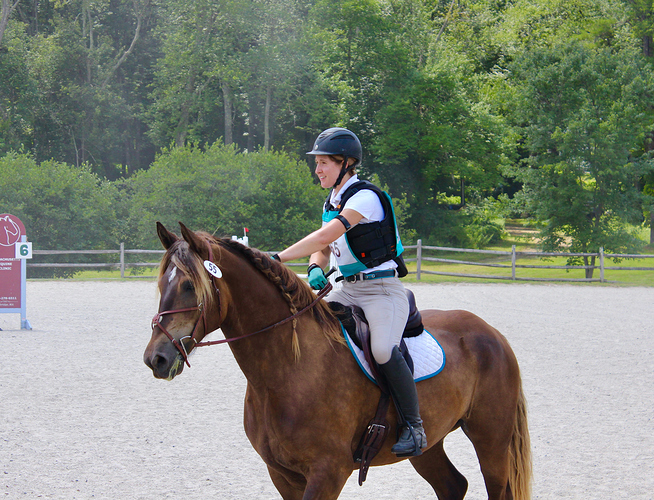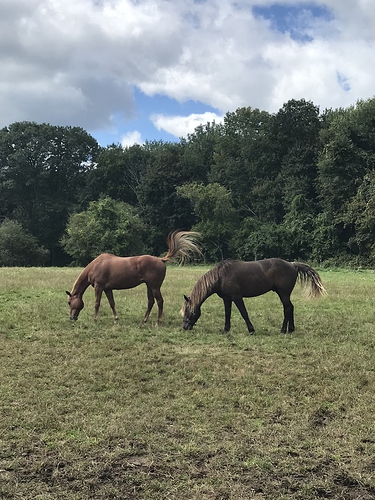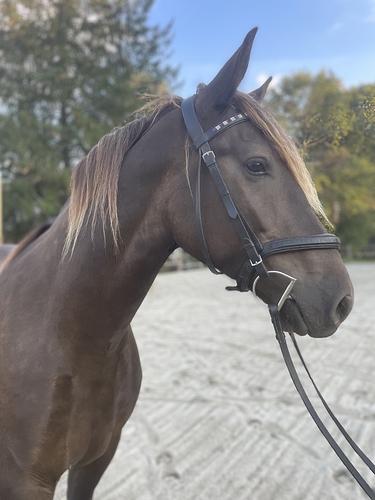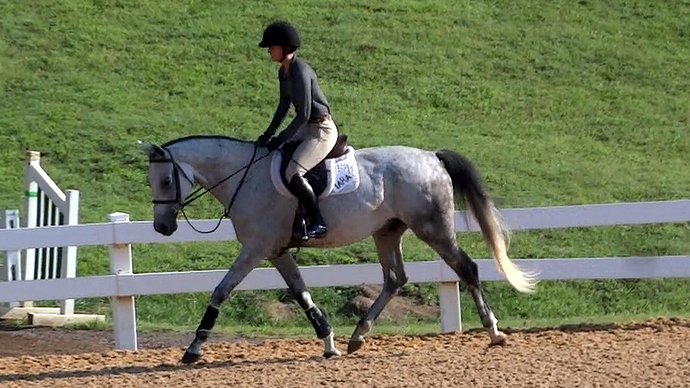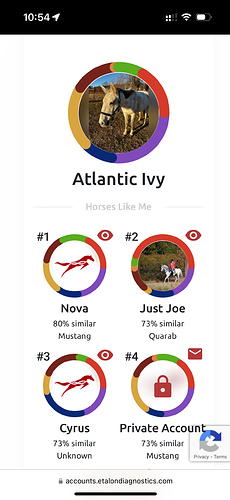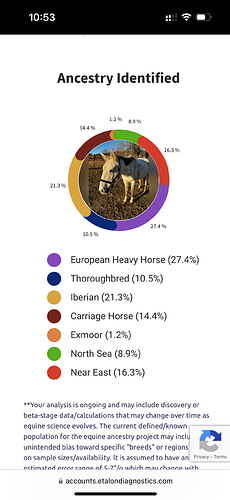Hi! This is my heart horse, of unknown heritage/originally semi-feral ended up at an Amish auction in Ohio. He is incredibly athletic and smart, with a lot of blood in him, about 17hh. My guess was Morgan/draft, but I sent out a DNA test and it came back as primarily Highland Pony, with some draft. He does look a lot like an oversized Highland Pony, but I wouldn’t think there are many of those in Amish country since it’s a rare breed in the US. What have other peoples experiences been with the DNA tests?
Well, the one I did came back about as, er, amusing. It told me this horse (built like a 15.3H pony) was most likely
- American Saddlebred
- Selle Francis
- Holsteiner
But, I went into it not expecting much more. As I understand it, there isn’t really enough genetic diversity between breeds to have specific markers to look for. For instance, the American Quarter Horse had so many TB ancestors that they would read “the same.”
Utterly unreliable in horses, nothing more than a fun game.
Horses haven’t been bred like dogs, for example, they simply don’t have that level of specific breed markers
The giant Shire mare at my barn’s results came back as Shire and Caspian pony.
The common association of DNA with this or that breed, as it is done in dogs, can be very misleading in horses. And other species.
DNA in any species isn’t a pure one-to-one match with a human-created ‘breed’. It is saying that this DNA has many of the same characteristics of xyz breed, as determined by individuals from that breed who were tested and included in the breed database.
It is like those occupational / career aptitude tests. They aren’t saying “you should be a ___” (cook, police officer, CEO). They are saying that you have many of the same characteristics as a great many other people successfully working in that profession who took the test.
So, a horse DNA test is saying that your horse’s DNA has certain characteristics found in the DNA of many individuals of a certain breed (or breeds). Individuals who were identified as being those breeds, who took the test, and are in the database.
The accuracy DNA tests for any animal species is really based on two things –
-
how broad is the database of tests from known individuals (that is, how many, how specific the individuals were to the breed characteristics), AND
-
the DNA-matching algorithm chosen by the company to determine the likeness between DNA profiles.
The broadest match is = yes, is a horse. Is matching the basic DNA characteristics that are possessed by every horse. Can rule out other species, is definitely a horse.
More specific match is = has many matching characteristics of Breed A. Or, of Breeds A, D, and M.
The database to match against does not come from every animal that took the test, because they are not all clearly identified by breed. It comes from the people who originated the database carefully selecting individuals to be in it. The more truly defined individuals, the better the database matches, because every animal breed has some range of variation that is part of the breed.
For understanding, dog breeds & DNA tests are a good comparison.
Dog breeds have far, far more specific variation between breeds than horses or cats.
-
The extreme variations in dog breeds of size, color, shape, etc., and
-
the close characteristics and line-breeding in individuals chosen for the DNA database,
… both make it much more possible to develop a database of characteristics that have a narrow range of commonalities for specific breeds, from Yorkshire Terrier to Great Dane.
Certain small population, closely bred dog breeds can be so specific, that it is possible to find an individual’s close ancestors even if those ancestors are not already in the database. Because most are related, even distantly.
Horses are not that way. There is far more overlap of characteristics among horse breeds. They are different, but not nearly as different as dog breeds.
And, horses tend to have a wider range of accepted characteristics within breeds. That increases the overlapping characteristics with other breeds, even if visually they are distinct.
A horse that obviously has TB characteristics is likely to show a ‘possible match’ with TB, QH, Standardbred, and any number of breeds with a strong TB infusion. Depending on how broad or narrow is the search algorithm.
The tricky part – a match of a crossbred TB to ‘QH’ doesn’t mean that a registered QH is in the horses ancestry. It just means that this horse has some TB-like DNA, and so do QH’s and several other breeds.
Warmbloods, of course … good luck. 
One more caveat to trying to determine the accuracy of a breed test by sight alone, basically identifying breed characteristics visually …
It is not possible to purely visually 100% identify the mix of breeds in an animal, because of the nature of DNA. Recessive, dominant, incomplete dominance, where the DNA is on the chain – all of those things can exaggerate some traits and hide others.
Some DNA acts on other DNA to change the appearance. From body shape and proportions to color.
Color is a prime example. People frequently make the mistake that a dog with one Golden Retriever parent is likely to be the color of a golden. But in fact it is most often black.
Because goldens are genetically dominant black with a recessive red modifier. Purebred goldens get the red modifier from both parents. But a cross with another breed or mix is unlikely to contribute a red modifier, and the dominant black from the golden is likely to be the color of the pup.
Horses have complicated color DNA, and other characteristics as well. We can often make a very good guess from visuals. But we can’t know what is being hidden in a horse’s DNA profile, just by looking.
I thought part Morgan right away when I saw pictures! She is beautiful no matter the breed!
My Clydesdale came back as Clyde, Shire, Connemara Pony.
If Caspian was the stud - & for the sake of the mare, I sure HOPE so! - he must have had a ladder 
If the tests are inexpensive, I think they’d make great gag gifts for friends 
That was sort of mine. My brother asked me what I wanted for Christmas and I thought, why not?
If your Bro spent under $20, I’m in 
Interesting and all makes sense. So perhaps some Morgans/random Amish pony types share a lot of the same genetic markers as Highland Ponies, even though not directly descended from them- maybe the same traits of hardiness, intelligence etc have been selected for either by accident due to the environment or on purpose by the Amish. I’ve also thought about how incredibly different some Morgans are even though they are considered the same breed.
It has been a few years, but I think it was about $35, from UC Davis (?)
Definitely see some Morgan in there, especially in the face. But the coloring and body type looks a lot like the several Rocky Mountain horses I know. Who knows, maybe that’s in the mix.
I agree with others here that DNA testing for horses is at best a fun indulgence. Don’t put any faith in them. Your horse is very handsome and you love him. That’s what matters most, right?
Oh yea I could care less about the results, I’m just curious/trying to figure out more about his history, and how to replicate him in the future lol, since he’s perfect. Never had a horse as healthy and low maintenance as him
i’ve run across a few morgans with that colouring too. Agree that it would be a fun gift - would be great item for a silent auction fundraiser for a local horse club type thing.
I feel like people rarely do these DNA tests on registered horses, because why would you? But that would be interesting. You’ve got an Arabian documented back 1000 years or a TB that goes back to the foundation sires 400 years ago. What will they test as? Also I understand that Northern draft horses and native European ponies share roots, so perhaps Clydesdales and Highland ponies for instance have some of the same markers (both Scottish breeds).
Many at-risk Morgans have been separated from their registration papers, their identity is lost. DNA testing can restore their Morgan identity and make rehoming easier for the rescue.
Some DNA panels have a section at the bottom that shows horses with similar results - and some of those horses have actual known parentage or known breed influence. That can help inform your opinion. We have a poster who discovered her Bowie Kill Pen horse was a mustang through utilizing that feature ( @one1horse ).
Yes, this was my experience and I used etalondx.com. They broke down breed “groups” my pony was most similar to by percentage, and then showed examples of other horses in their database who had DNA profiles similar to my pony. Most of them were mustangs, which led me to being able to track down her identity with her unregistered microchip. She is white, so you can’t see her freeze brand at all.
Otherwise from all the research I’ve done, I think @OverandOnward nailed it in their description. These tests are comparing the similarity of the DNA profiles to DNA of known breed horses rather than testing the horse and saying “This is XYZ breed DNA!”.
Screenshots of what some of the results look like from Etalon are below.

